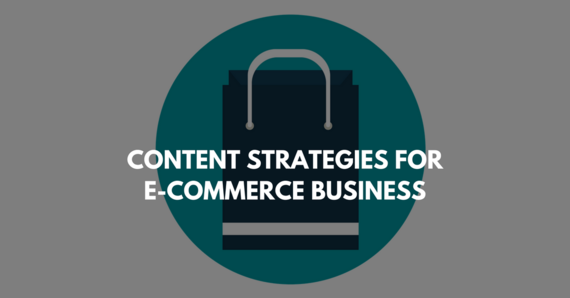If you are in the ecommerce business, you cannot deny the magnetic power of sales. The more you sell, the more your confidence grows, as does your determination to improve the experience for your customers, and to expand your existing market.
You might think:
- If I'm in a product business, what's the use of creating more content?
- Buyers look at the product, not at the content while making a purchasing decision.
- It is the product that makes a meaningful impact in buyer's life.
But, to an extent, you would be wrong!
In reality, content creates the mood. The way you present your product, in the form of audio, textual descriptions, video, links, and animations; this is what makes a long-lasting impact on your visitor's mind.
Here are some content strategies that will banish your doubts, and that will improve your website sales:
Differentiate Between Shoppers and Buyers
Two kinds of people visit your e-commerce website:
- Shoppers: These people are aware of their problem, but don't know how to pick the right product to solve it. As a result, they wander from one website to another, searching for the right offer.
Shoppers need more education when compared to buyers. Don't try to persuade them with cheap offers, instead, work at building strong connections by delivering valuable content.
Educate and engage them with e-books, whitepapers and blog articles.
Different people react differently to different content. Buyers, for example, prefer the purchase button to an educative series. They tend to skip over the education phase, and quickly look for free trials and case-studies to help them understand the product in detail.
Sell the Experience, Not Just the Product
People don't shell out their hard earned money just for a physical product. As many companies compete for sales of the same kind of product, potential buyers are really interested in the following questions:
- How will the product benefit them?
- What are other people saying about the product?
- Why does one company's product overshadow another company's product in the same category?
- How is the product going to affect their lives?
Words, expressed textually or verbally, have the power to generate curiosity. Curiosity gives birth to engaged prospects. Engagement drives sales.
How can e-commerce business owners enhance the user-experience?
- Use Magento, a cloud-based digital commerce platform, to stay away from complex and hectic website setup. This will allow you to focus solely on your customers. Magento extensions and plugins enhance conversion rates by working on developing an efficient shopping gateway, and a wide range of effective online store management possibilities.
Power of Balance
Every company wants to stand out from the crowd, but few of them take the concrete steps essential to make that big leap.
Big brands understand the importance of balancing content for search engines and readers simultaneously.
Make a list of keywords for your product page for search engines, but don't overstuff keywords because it is considered, by those same search engines, a black hat tactic.
Check out the following example:
"If you are looking for cheap backpacks, your wait is over. Our website showcases a variety of cheap backpacks by keeping your basic needs in mind. Check out our cheap backpacks section to make your camping memorable. Due to rising demand, our cheap backpacks don't stay on the shelf for long. What are you waiting for? Make an instant decision to buy our cheap backpacks."
The repetition of the keyword, "cheap backpacks," detracts from the written content. It almost compels the reader to leave the page. It dilutes the user experience.
Create Content with the Ideal Customer in Mind
Buyer Personas provide a solid framework for devising an effective content strategy. Write your product descriptions by understanding the problems, needs, and desires of your target audience.
Some website owners take short cuts by copying other's content. Don't write your description to just fill the page. Quality is the ultimate winner.
Strip away all the promotional tactics and write in your own voice. Your unique blend of services, and innovative business, is what will make you different in a competitive marketplace.
Present your content with a human touch. Demonstrate your concern towards your buyers. Let visitors realize you are not in the market just to fill your own pockets. You want to see happy faces.
Buyers will not be interested in your offer until they find something of real value for them. Don't just focus on features.
Explain the benefits by addressing the issues. Create a visual effect in the buyer's mind. For better reading, break your content into digestible sentences and bullet points.
According to Forrester's report, 72% of US online consumers prefer to use a company's web site to get answers to their questions, rather than contact them via telephone or email.
Create an FAQ page to answer all the repetitive queries from your readers. It helps every website visitor if they are able to clear away all doubt before making the decision to purchase.

